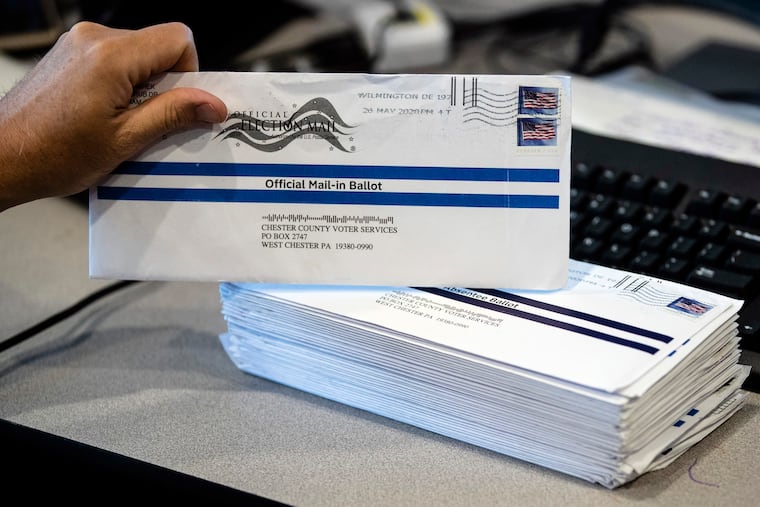As Nov. 3 approaches, voters deserve to have confidence in election system | Editorial
As the Nov. 3 election approaches, questions remain about how Pennsylvania will handle the unprecedented increase in voting by mail. One answer: If you vote by mail, do it early.

Except for the date — Tuesday, Nov. 3 — nearly everything about this year’s presidential election process has become contentious. This is especially true of voting, a formerly straightforward exercise that’s become fraught with partisanship, confusion, or even fear. A deadly pandemic and a divided electorate have eroded trust in the safety and integrity of casting and counting ballots. Avoiding a debacle will require voters, regardless of party, to educate themselves and demand clarity and transparency from election officials.
New Jersey may be ready to conduct its first general election mostly by mail more successfully than Pennsylvania. The Garden State’s Democratic-controlled legislature aims to double the number of mail-in ballot drop boxes. In Pennsylvania, the Trump reelection campaign has filed suit in federal court to prevent the use of such boxes anywhere in the commonwealth; the Republican-controlled legislature in Harrisburg is considering a ban as well.
» READ MORE: Everything you need to know about voting by mail, or in person, in Pennsylvania
Ballot drop boxes have been available for years in other states, providing a reliable alternative delivery system for those who want to vote by mail without relying on the U.S. Postal Service. President Donald Trump has methodically trashed that once highly respected American institution and continues to make scurrilous assertions that voting by mail is conducive to fraud. Despite one recent incident during a special municipal election in Paterson, N.J., mail-in ballot fraud is exceedingly rare.
Postmaster General Louis DeJoy, a Trump appointee who made controversial operational changes at USPS facilities in Philadelphia and elsewhere before discontinuing them, says the postal system can handle a vote-by-mail volume surge. Whatever reassurance he may have provided notwithstanding, last Wednesday and Thursday, the president urged his supporters to vote by mail and vote a second time in person, claiming, preposterously, that doing so — which is illegal — would test fraud detection capabilities.
» READ MORE: ‘It’s satisfying every time.’ Meet 5 Philly-area poll workers who live and breathe Election Day democracy | Opinion
Timely resolutions of balloting-related legal disputes now before federal and state judges in Pennsylvania are certainly possible. Gov. Tom Wolf, a Democrat, and the Republican-controlled legislature may compromise and implement more practical deadlines for receiving and counting mail-in votes. But as things stand, mail-in ballots must be requested between now and Oct. 27 and received by 8 p.m. on Nov. 3. The same deadlines apply for “absentee ballots” (essentially the same as a mail-in ballot). Philadelphia and its suburban counties plan to open satellite offices to provide and accept these ballots.
Obviously, the short window between ballot request deadlines and voting is problematic even in the best of times. Given ongoing delays with mail delivery, voters who plan participate by mail-in voting should waste no time and request those ballots today.
Pennsylvania’s voter registration deadline is Oct. 19. Nonpartisan organizations such as the Committee of 70 and the League of Women Voters of Pennsylvania are reliable sources of information. This question and answer guide by The Inquirer’s Jonathan Lai is an invaluable resource.
Sadly, for too many Pennsylvanians, the right to vote appears to matter little. In 2016, 1.3 million residents eligible to vote weren’t registered, according to the Department of State, and only 70% of the 10 million registered actually voted.
Women, and Black people, had to fight for the vote. Political interference with this right is a sacrilege ... but so is not using it.